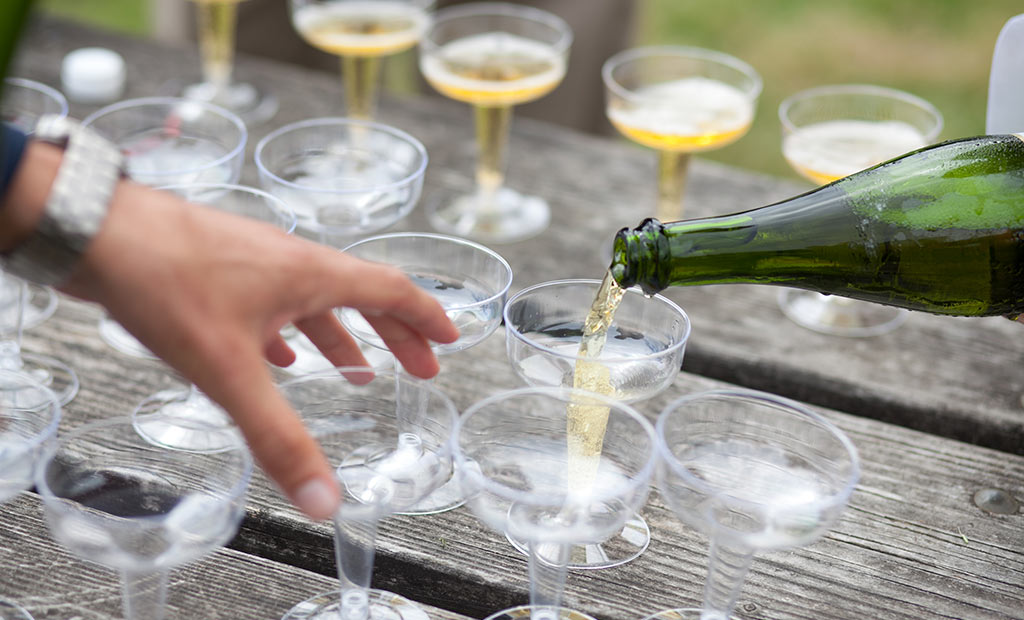What is a TEN?
TEN stands for Temporary Event Notice. A TEN is a notice that gives you permission to hold a small public event (up to 499 people) involving licensable activities, such as the sale of alcohol, without any further authorisation.
Why do these activities require a licence?
There are four Licensing Objectives that applications must look to promote. These are:
- The prevention of crime and disorder
- Public safety
- The prevention of public nuisance
- The protection of children from harm
Each objective is of equal importance.
Do we need a TEN for our event?
If you plan to hold an event that includes any of these ‘licensable activities’ on unlicensed premises in England or Wales then you will need a TEN. The process of applying is formally known as ‘serving’ a Temporary Event Notice. You’ll also need a TEN if a particular licensable activity is not included in the terms of an existing Premises licence.
Licensable activity includes:
- Selling alcohol
- Serving alcohol to members of a private club
- Providing entertainment, such as music, dancing or indoor sporting events
- Serving hot food or drink between 11pm and 5am
As a result of deregulatory changes that amended the 2003 Act, NO LICENCE IS REQUIRED for the following activities:
- Plays: no licence is required for performances between 08:00 and 23:00 on any day, provided that the audience does not exceed 500.
- Dance: no licence is required for performances between 08:00 and 23:00 on any day, provided that the audience does not exceed 500.
- Films: no licence is required for ‘not-for-profit’ film exhibition held in community premises between 08:00 and 23:00 on any day, provided that the audience does not exceed 500 and the organiser (a) gets consent to the screening from a person who is responsible for the premises; and (b) ensures that each such screening abides by age classification ratings. The deregulation guidance further explains, “Under this exemption, one condition is that the film entertainment is not being provided with a view to profit. An entry charge does not of itself make the film entertainment licensable; it is whether the organiser intended to make a profit (that includes raising money for charity). A charge or contribution that is made solely to cover the costs of the film screening is consistent with ‘not being provided with a view to profit’. The ‘not with a view to profit’ condition applies solely to the activity of exhibiting the film under this exemption. A charge with a view to making a profit may legitimately be levied for any other activity or event that is distinct from film admission, such as the provision of refreshments, film talks, or a social event.”
- Indoor sporting events: no licence is required for an event between 08:00 and 23:00 on any day, provided that those present do not exceed 1,000.
- Music: no licence is required for a performance involving amplified live music and/or recorded music between 08:00 and 23:00 on any day, at the non-residential premises of a school, provided that the audience does not exceed 500, and the organiser gets consent for the performance on the relevant premises from the local authority concerned or the school.
How many TENs can I apply for in a year?
You need a TEN for each event you hold on the same premises. You can get up to five TENs a year. If you already have a personal licence to sell alcohol, you can be given up to 50 TENs a year. A single premises can have up to 15 TENs applied for in one year, as long as the total length of the events is not more than 21 days.
How long does a TEN last for?
Under a TEN, an event can last for up to a maximum of 168 hours. This relates to the period during which the licensable activities can be carried on, and does not relate to the preparation and setting-up time, packing away or clearing up time. The same premises cannot be used on more than 15 occasions in any calendar year. In addition, each premises is subject to an aggregate of 21 days’ use, irrespective of the number of individual occasions on which they have been used. There must be a minimum of 24 hours between events at the same premises.
How do I apply for a TEN?
Contact your local Council to apply for a TEN if you want to carry out a ‘licensable activity’ on unlicensed premises in England or Wales. The application process can usually be completed online.
Should a PTA office or member of school staff apply?
The person who applies should be the one who will be responsible at the event to ensure the licensing objectives are met. If the event is a PTA event, a PTA representative should apply.
Is it possible to get a late TEN?
There are two types of TENs you can apply for. A standard TEN, which needs to be applied for at least 10 full working days before the event. Or a late TEN, which can be applied for between five and nine full working days prior to your event. It’s best to apply for your TEN well in advance if you’re able to, as a late TEN is only used in emergencies. The day count used in the above does not include the day of application and the day of the event. Public holidays are not included as working days, and the onus for any delays in delivery of your application to the licensing office remains on the applicant. With a late TEN, if there are any objections to the event by the police or environmental health then there is no right to appeal and the event will not be able to ahead.
How much is a TEN?
A TEN costs £21.
If a PTA offers a free glass of wine with the ticket price or holds a wine tasting event, do we still need a TEN?
Your event would still be classed as the ‘supply of alcohol’, defined in the Licensing Act as: ‘the sale by retail of alcohol, or the supply of alcohol by or on behalf of a club to, or to the order of, a member of the club.’ This ‘sale’ includes prepaying for a ticket then getting a ‘free’ alcoholic drink as part of an all-inclusive ticket. Alcohol is only ‘free’ if it is given away with no conditions attached. The low cost of a TEN means it isn’t worth trying to find a way to circumvent the laws. If you do not have a TEN and carry out an activity that you should have a licence for (or allow your premises to be used for one), you can be fined, sent to prison for up to 6 months, or both.
The PTA is planning an event where we expect to sell more than 499 tickets. What should we do?
Contact your local Licensing Authority immediately as a TEN will not cover you for your event. The limit for participants under the authority of a TEN is 499 and that includes staff. You may need to apply for a Premises Licence for a big event. Allow a minimum of two months from applying for a Premises Licence to it being granted. This allows for a 28-day consultation process and a Licensing Committee Hearing if there are objections to the licence.
Should we speak to the head about obtaining a Premises Licence? How much does this cost?
A Premises Licence covers the school or PTA for any number of events up to 5,000 people. If you want a Premises License for regulated entertainment only and do not have the sale of alcohol included as an authorised activity, there is no fee. Many schools already have this, so it’s worth checking. All the applications include a 28-day consultation process. This involves you copying your application to the ‘Responsible Authorities’, which are bodies such as the police, trading standards, the fire brigade, environmental health, etc. A public notice would be placed at the school and in a local newspaper. If you include the provision of alcohol on the licence you will need a DPS (Designated Premises Supervisor). There is an application fee and then an annual fee, which is due to keep the licence valid. Generally, Premises Licences do not expire unless they are for specific events.
Further information
- The equivalent licence for Scotland is an Occasional licence. Apply here
- Licensing guide: All you need to know
- Licensing for film events
- Raffle FAQs
- Read our fundraising glossary
The above is intended as guidance only. We recommend that you contact the relevant organisations with specific reference to insurance, legal, health and safety and child protection requirements. Community Inspired Ltd cannot be held responsible for any decisions or actions taken by a PTA, based on the guidance provided.








